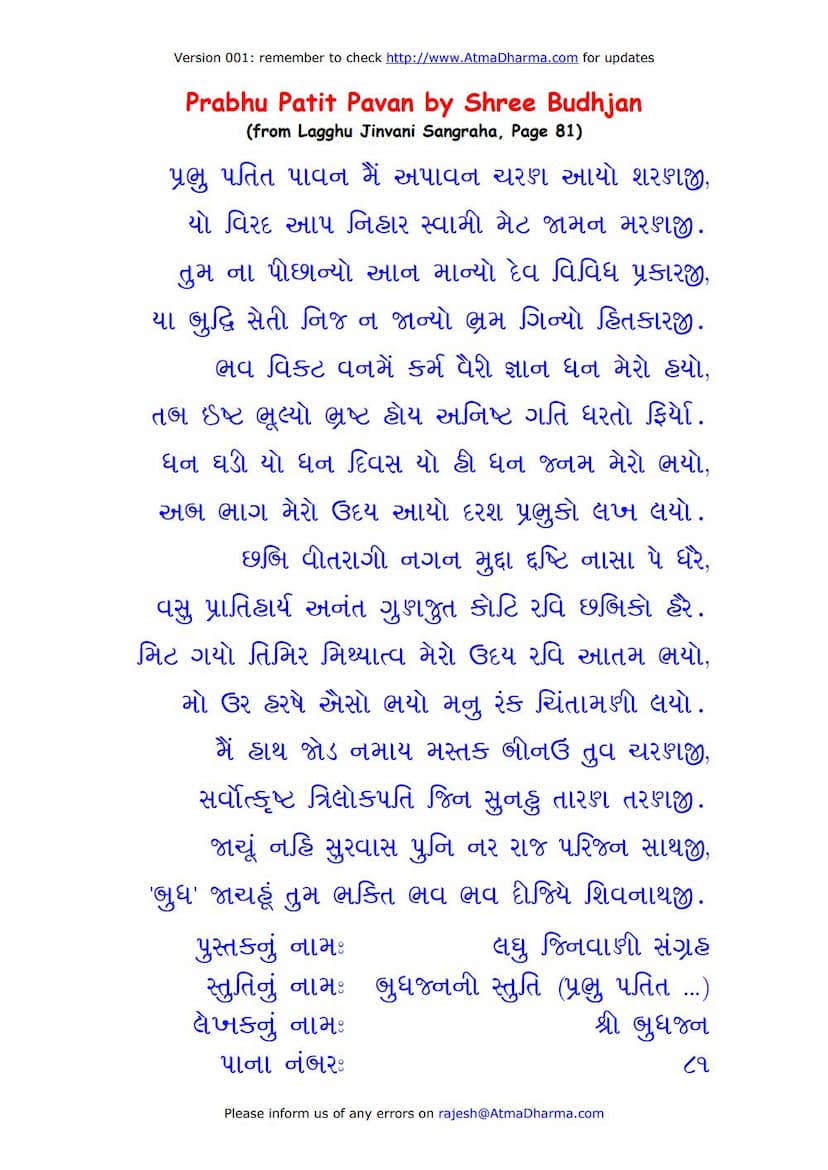Prabhu Patit Pavan Shri Budhjan
Added to library: September 2, 2025

Summary
Here's a comprehensive summary of the provided Jain text, "Prabhu Patit Pavan Shri Budhjan," based on the single page of text provided:
Book Title: Prabhu Patit Pavan Shri Budhjan Author: Budhjan Kavivar Publisher: ZZZ Unknown Catalog Link: https://jainqq.org/explore/008394/1 Source Information: From Lagghu Jinvani Sangraha, Page 81. The specific hymn is titled "Budhjan ni Stuti (Prabhu Patit Pavan...)" written by Shree Budhjan.
Summary:
This devotional hymn, "Prabhu Patit Pavan," is a heartfelt prayer from the poet Budhjan to Lord Jinendra, acknowledging the Lord as the purifier of the fallen and impure. The poet begins by recognizing his own impure state and his arrival at the Lord's feet. He confesses his past ignorance, having mistaken other deities and failing to understand his true self, leading him to wander through the difficult cycle of birth and death (bhava) in the forest of existence, where his wealth of knowledge was destroyed by the enemy of karma.
He then expresses immense gratitude for the auspiciousness of the current moment, describing it as a blessed hour, day, and birth, signifying the dawn of his good fortune. He has finally come to behold the Lord.
Budhjan describes the serene appearance of the Lord, who is depicted as naked, with his gaze fixed on the tip of his nose. He also alludes to the eight supreme symbols of honor (Vasuprapratiharya) and the Lord's infinite virtues, comparing his radiance to that of millions of suns.
The poet declares that the darkness of false beliefs (mithyatva) has vanished with the "rise of the sun" of his own soul (atma). He compares his joy to that of a pauper receiving a wish-fulfilling jewel (Chintamani).
With folded hands and bowed head, Budhjan implores the Lord, who is the supreme Lord of the three worlds and the ultimate savior, to listen to his plea. He states that he does not seek heavenly abodes or worldly pleasures like kingship or the company of family. Instead, 'Budh' (the poet) humbly requests the Lord's devotion, asking to be granted the state of spiritual liberation (Shiva) in every life.
In essence, the hymn is a profound expression of:
- Self-realization of impurity: The poet acknowledges his fallen state.
- Devotion to Jain Tirthankaras: He recognizes Lord Jinendra as the ultimate purifier and savior.
- Gratitude for spiritual awakening: He celebrates the moment of gaining true vision and understanding.
- Admiration for the Lord's attributes: He praises the Lord's serene demeanor, virtues, and radiance.
- Aspirations for spiritual liberation: His ultimate desire is for devotion and attainment of moksha, not worldly gains.
The hymn reflects a deep sense of humility, surrender, and longing for spiritual progress within the Jain philosophical framework.